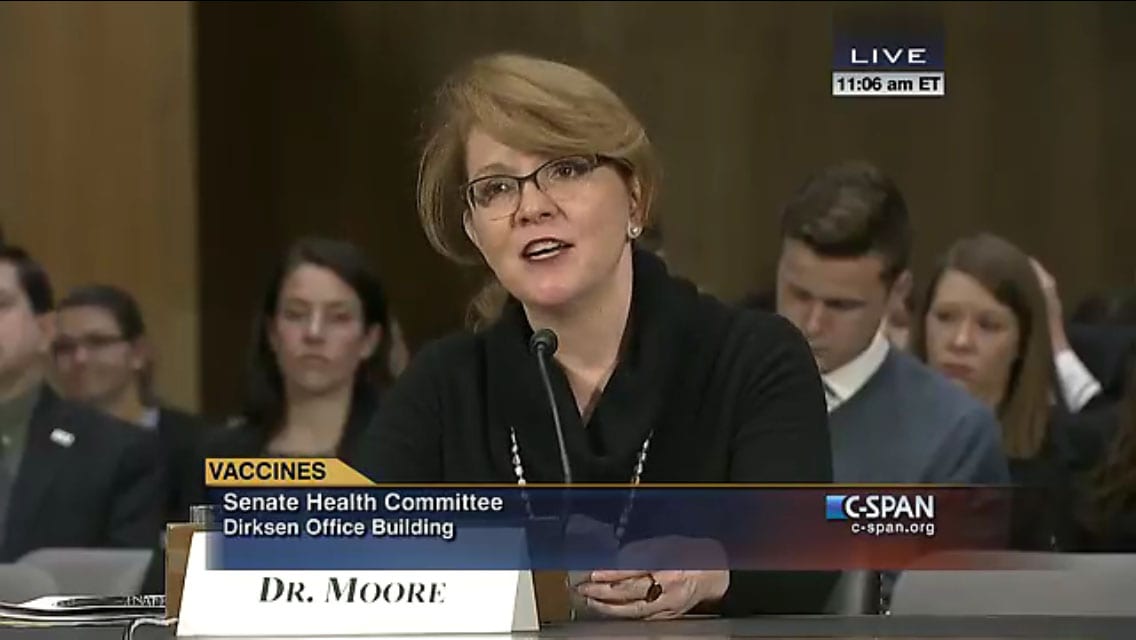AVAC Spotlight: Dr. Kelly Moore
Tennessee Immunization Program at the Tennessee Department of Health (TDH)
Dr. Kelly Moore understands firsthand the importance of our nation’s public health immunization infrastructure. She grew up with a beloved aunt who was a polio survivor, making her a passionate advocate for vaccines from an early age. She now serves as the director of the Tennessee Immunization Program (TIP) at the state’s Department of Health where she and her team are responsible for the state’s federally-funded immunization services, including the Vaccines for Children Program, the state immunization registry (“TennIIS”), and vaccine-preventable disease surveillance and outbreak response.
“Vaccines help us live our best possible lives from the time we’re born,” says Moore. Vaccination rates for children are remarkably high, but rates for adults are kept low by a number of complicating factors—financial barriers, storage and record-keeping requirements, and a lack of public awareness, provider education, and patient access. That’s why every state immunization program receives federal funds to support these critical tasks and ensure that recommended vaccines get to the patients who need them. These programs use a combination of funds from the Centers for Disease Control and Prevention’s Immunization program (also known as the 317 program) and the Prevention and Public Health Fund (PPHF), which was created under the Affordable Care Act and supports vaccine programs for both children and adults.
What do immunization programs do? A lot!
Everything from educating healthcare providers and the public – especially making sure that vulnerable populations learn about vaccines they need and understand how they can get them—to answering questions about adverse events from clinicians to overcoming vaccine myths and misinformation with good, unbiased and evidence-based advice…and a whole lot more in between. Dr. Moore promotes the adult immunization standards published by the National Vaccine Program Office at the U.S. Department of Health and Human Services: every adult healthcare provider should review a patient’s immunization record, recommend needed vaccines, offer referrals if needed, and make sure they and their staffs are fully immunized. The TN immunization program also provides extensive support to clinics to help them store and handle these fragile vaccines properly, so they work as intended. If a clinic has a storage problem, they can consult with the immunization program team for help. This service helps prevent the discarding of good vaccines or the accidental administration of compromised vaccines.
Immunization programs also use their federal funds to support their immunization information system (IIS), also known as a registry. Every state has an IIS, and although most people think of registries as helpful just for keeping up with childhood immunizations, at least 42 of them maintain immunization records across patients’ full lifespans. The use of registries prevents lost records and repeat shots because a person cannot find their records. They also can project what a patient needs based on what they have had previously (preventing both over- and under- vaccination), and track coverage to remind patients when they need certain vaccines. IIS have become the most essential tool we use in every aspect of our work in state programs to optimize the use of vaccines to prevent disease in children and adults.
All of this infrastructure is also essential for our nation’s preparedness to respond to a vaccine-preventable disease emergency. The next serious influenza pandemic is not a question of if, but when. The TN immunization program led the state’s strong response to the 2009 pandemic—all of the routine work and relationships were translated into vaccine distribution to more than 1,500 clinics and pharmacies to vaccinate adults and children. Their communication and collaboration with partners led to broad-based, swift access to vaccines for both the public and healthcare personnel.
The 2009 pandemic was nearly a decade ago—back then, the role of TennIIS was more limited and less critical, since each person required only one dose of vaccine. The next pandemic, though, will be different. It is likely to require two doses of vaccine per person and thus would be even more challenging to control, making it more dangerous to our health and the economy. Federal investments have led to critical advances in the interoperability between IIS and electronic health records that will allow us to use these tools to protect our population more efficiently next time, but these electronic infrastructure investments must be sustained. Whether it’s pandemic response or public or provider education or IIS, federal funds are a crucial foundation for a stable and strong immunization program. Without them, our nation would not realize the health and economic benefits of being free of vaccine-preventable diseases.
Despite the great advances in vaccines for adults and in IIS, there are still structural and financial challenges that thwart our efforts to achieve the full health and economic benefits of high immunization rates among adults as we have with children. We are all lucky that Dr. Moore and others like her have dedicated their careers to addressing these challenges and driving increased access and utilization of adult vaccines.
